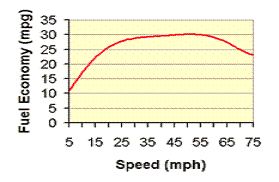
Drive Sensibly
Aggressive driving (speeding, rapid acceleration and braking) wastes gas. It can lower your gas mileage by 33 percent at highway speeds and by 5 percent around town. Sensible driving is also safer for you and others, so you may save more than gas money.
Fuel Economy Benefit:
5-33%
Equivalent Gasoline Savings:
$0.20-$1.35/gallon
Observe the Speed Limit
Graph showing MPG VS speed MPG decreases rapidly at speeds above 60 mphWhile each vehicle reaches its optimal fuel economy at a different speed (or range of speeds), gas mileage usually decreases rapidly at speeds above 60 mph.
You can assume that each 5 mph you drive over 60 mph is like paying an additional $0.30 per gallon for gas.
Observing the speed limit is also safer.
Fuel Economy Benefit:
7-23%
Equivalent Gasoline Savings:
$0.29-$0.94/gallon
Remove Excess Weight
Avoid keeping unnecessary items in your vehicle, especially heavy ones. An extra 100 pounds in your vehicle could reduce your MPG by up to 2%. The reduction is based on the percentage of extra weight relative to the vehicle's weight and affects smaller vehicles more than larger ones.
Fuel Economy Benefit:
1-2%/100 lbs
Equivalent Gasoline Savings:
$0.04-$0.08/gallon
Avoid Excessive Idling
Idling gets 0 miles per gallon. Cars with larger engines typically waste more gas at idle than do cars with smaller engines.
Use Cruise Control
Using cruise control on the highway helps you maintain a constant speed and, in most cases, will save gas.
Use Overdrive Gears
When you use overdrive gearing, your car's engine speed goes down. This saves gas and reduces engine wear.
Note: Cost savings are based on an assumed fuel price of $4.08/gallon.
Buy an Efficient Vehicle
Buying an efficient vehicle is the most important fuel economy decision you can make. The difference between a car that gets 20 MPG and one that gets 30 MPG amounts to $1,020 per year (assuming 15,000 miles of driving annually and a fuel cost of $4.08). That's $5,100 extra in fuel costs over five years!
 Print
Print Email
Email







